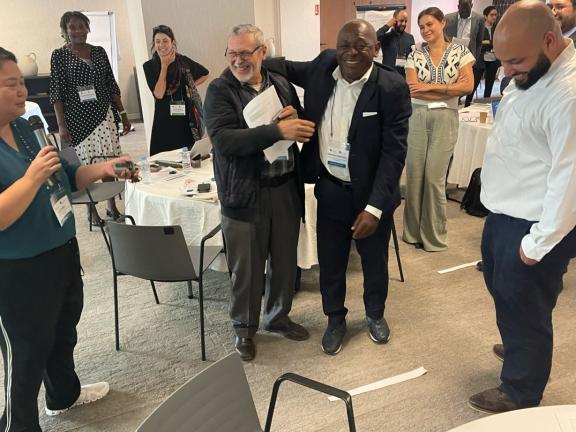The IRM releases results from 2024 Stakeholder Survey
In May 2024, the Independent Redress Mechanism (IRM) conducted its annual survey to evaluate its performance and identify areas for improvement. The survey reached a diverse group of stakeholders, including complainants, requesters, civil society organizations (CSOs), accredited entities, and GCF colleagues. These stakeholders had interacted with the IRM in various ways, such as through webinars, capacity-building training, complaints, and information requests.
The survey received 33 responses, a slight decrease from the 40 responses in 2023. The survey included both quantitative questions, such as ratings and the number and types of interactions with the IRM, and qualitative insights gathered from open-ended questions for feedback and comments. The primary goal of conducting these yearly surveys is to assess the IRM’s performance and pinpoint areas for improvement. This process is crucial for the IRM to effectively fulfill its mission and mandates, which encompass five key functions aimed at providing redress and advancing accountability within the Green Climate Fund.
Positive Feedback and Key Strengths
Overall, the feedback from stakeholders regarding their interactions with the IRM was positive. According to the survey, the IRM’s strongest qualities are transparency, responsiveness, respectfulness, and independence. Respondents were asked to highlight any particularly positive aspects of their interactions with the IRM. Many comments emphasised the IRM’s strengths in transparency, professionalism, capacity-building training, and engagement with CSOs. Several stakeholders have indicated their appreciation for the IRM’s level of professionalism, which has increased their confidence and trust in working with the IRM. The quality of the capacity-building trainings was also praised, with stakeholders noting the methodological approaches based on general human rights principles and safeguards, as well as positive feedback on interactions with IRM staff. Additionally, the IRM’s engagement with CSOs was highly valued, as it gives them a voice that is being heard, and several respondents mentioned the IRM's innovative outreach initiatives.

Challenges and Areas for Growth
However, the survey also highlighted areas for improvement and challenges. Language barriers were noted, as communication in English is not easy for all stakeholders, particularly those from non-English-speaking regions. Another significant area for improvement is the follow-up with key stakeholders after the closure of IRM cases. Respondents highlighted the need for ongoing communication and support to ensure that stakeholders remain informed and that their concerns are adequately addressed.
Recognising communication and language barriers as significant obstacles to accessibility for stakeholders and limitations to its work and mission, the IRM’s 2025 action plan outlines a series of strategic initiatives. The IRM will optimize its resources for translation and interpretation to ensure that all stakeholders have access to accurate and comprehensible information. Additionally, the IRM will focus on strengthening the capacity of the GCF Direct Access Entities' (DAEs) grievance redress mechanisms through both in-person and virtual activities, while reinforcing its pioneering role in building these capacities. Finally, to ensure that stakeholders fully understand the IRM’s complaint handling process, the IRM will work on increasing awareness through various platforms and formats.
By implementing these measures, the IRM aims to enhance its ability to provide effective redress and advance accountability within the GCF. This approach supports the overarching goal of mitigating the impact of climate change while fostering sustainable development.
---
Read the 2024 annual survey here.
